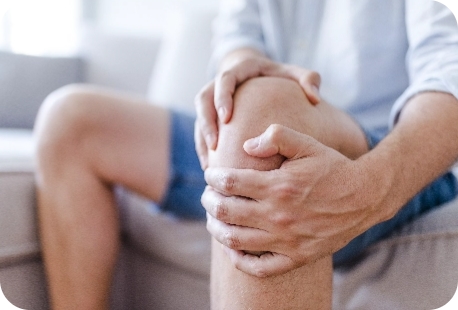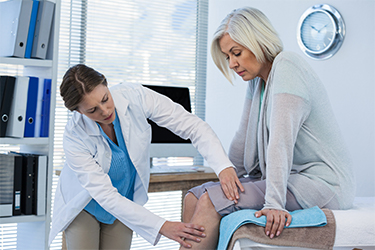

Knee
GENERAL INFORMATION
Healthy knees are central to facilitating the ability to stand up, sit down, walk and run. Injuries to the knee can limit or decrease mobility. Puget Sound Orthopaedics (PSO) knee surgeons have performed many procedures treating conditions typically caused by arthritis, sprains, strains and fractures. Whether treatment consists of surgical or nonsurgical options, PSO surgeons are committed to helping patients get moving again.
The knee is a complex joint that bends and straightens like a hinge. There are three (3) bones that make up the knee: the femur (thighbone), which is the strongest and longest bone in the body, tibia (shinbone) and patella (kneecap). While it does not directly affect the knee’s movement, the smaller fibula (calf bone) is connected by ligaments to the tibia and supports the tibia’s function.
For the knee to function properly, all of the bones must work in tandem with four (4) primary ligaments that hold the three bones together. The medial (MCL) and lateral collateral (LCL) ligaments control the sideways movement. The anterior cruciate (ACL) and posterior cruciate (PCL) ligaments control the back and forth motion. In addition two (2) menisci act as “shock absorbers.” The menisci are made up of cartilage and help cushion and stabilize the joint.
Injuries to the Knee
Injuries to the knee often cause a sensation that feels like the knee is giving way, also known as instability. All three bones are prone to fracture but the kneecap breaks more often because it acts as a shield for the joint. The kneecap can become unstable or dislocate if it slips out of its v-shaped groove in the femur.
Another type of fracture is proximal tibia (shinbone) fractures, where the wider upper part of the bone that is a part of the knee joint breaks. If the break extends into the knee joint then the fracture is called tibial plateau fracture.
While arthritis can take many forms, the condition generally is inflammation of the joints. One of the prevalent types of arthritis is osteoarthritis (sometimes referred to as “wear and tear” and typically is found in older people). Osteoarthritis, rheumatoid arthritis, and posttraumatic arthritis are common types of arthritis found in the knee.
Athletes who play high demand sports, such as soccer, football and basketball are subject to injury to one of the four cruciate ligaments. A quick change in directional movement or an awkward landing from a jump can cause a tear. A blow to the front of the knee is the typical cause of a tear occurring in the PCL. Any force that pushes the knee sideways can result in an injury to the MCL or LCL.
When to See a Specialist
Seek medical treatment from a knee specialist if you are experiencing any of the following symptoms:
- Pain or swelling in the knee
- Feeling like the knee is “catching” or “locking up”
- A “popping” noise associated with the time of injury
- An inability to put weight on the knee or move the knee
Treatment Options
Your doctor will discuss all treatment options with you. The best treatment for your injury or condition will be determined in combination with your overall health.
There are several nonoperative treatment options for knee pain. These might include physical therapy, pain management in the form of over-the-counter or prescribed medications and/or anti-inflammatories or immobilizing the afflicted knee with a brace. If surgery is necessary, PSO knee specialists can perform a wide variety of procedures ranging from minimally invasive to major reconstruction.
Common Conditions
And more…
Our specialties extend beyond what you see here. If you have a special need, make an appointment with us!









